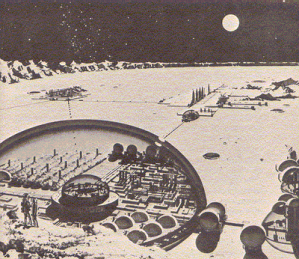I take great pains in Innovation and Nanotechnology to point out that the sci-fi vision of molecular nanotechnology is a long ways off. While the utopian visions of Drexler and Kurzweil are, I believe, ultimately achievable, MNT may never be achieved in my lifetime. But this is not keeping serious researchers from attempting to achieve it, nor keeping ethicists from considering its effects. I point to the Smalley-Drexler debate about the feasibility of MNT, and an excellent summary of (at least) six physical challenges to achieving MNT. I remain skeptical about the optimistic timeline offered by some, as I have been disappointed in the slow-pace the relatively simple task of colonizing other planets has taken. But extrapolating about the past in the speed and achievements of another nanodomain’s accomplishments, namely the considerable miniaturization of computing technologies, gives me hope about the ultimate likely achievement of MNT, perhaps in the next hundred years.

So my musings and concerns about the role of IP in potentially hindering the full achievements of MNT may seem premature. But if researchers are trying to achieve the technology, and futurists, policy-makers, and others are preparing in numerous ways for its eventuality, then I believe it’s appropriate to face the problem of IP now. Moreover, and as I argue in the book, we are in a transitional stage, with the advent of cheap 3D printing, where IP may already pose a hindrance to its commercially revolutionary potentials.

Nanowares, the broader term I use to encompass all distributed manufacturing technologies, are already here. They are already disruptive and liberating to our creative abilities. Entrepreneurs with good ideas can begin manufacturing (albeit limited forms of) new, valuable, and even necessary products. New markets for the types (as opposed to tokens) have already been created, as pointed out in this blog. The IP issues I am talking about are already a concern, and have already driven many in this nascent community to adopt and work under open source schemes, and to avoid litigation and lawyers, and profit outside of the IP regime. True MNT may be a long, long way off, or it may be around the corner, but nanowares are already here, and the time to come to grips with IP’s stifling effects on the future of innovation is now.


Sorry to hear your voice was silenced by the IP maximalists. I read your book and whilst I think there are alternatives, at least you put forth a solid proposal unlike going on autopilot. For your interest, if you look back at history, some of the greatest periods of creativity (eg Germany during the chemical discoveries, pre-1980s PC software) didn’t rely on patents. Bressen and Lemel (sp?) all point out the deadweight costs of patents. Unfortunately 3D printing is a posterchild for rampant (and probably unfounded) fears about cultural contamination (printing out drugs!)